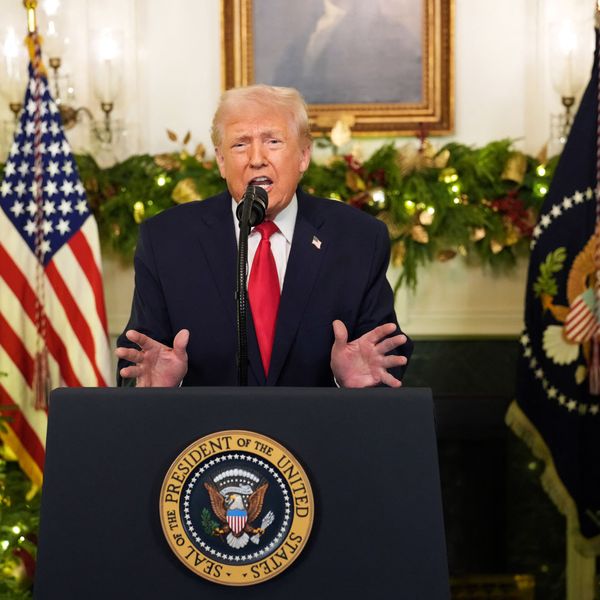Failing the Poor and the Economy, Kansas Gov Signs 'Regressive' Tax Deal
Law will impose $384 million tax hike on sales tax and items most often purchased by low-income earners
Following the end of the longest legislative session in state history, which dragged on an extra 23 days, Kansas Governor Sam Brownback on Tuesday signed a massive budget deal into law that includes a $384 million tax hike--mostly on the poor.
It's the largest tax increase ever introduced in the state, and more than half of it will come from sales tax and cigarette tax, which financial experts have long warned are regressive and punitive for low-income people as they force them to pay a larger percentage of their earnings than someone in a higher bracket.
The deal upholds many of the tax cuts Brownback introduced in 2012, which gave an annual $24,000 windfall to wealthy Kansans--which they will keep--but drove tax rates up for the poorest 20 percent of the state. It also cuts $50 million from the state budget.
Brownback went whole hog to convince lawmakers to pass the deal, including crying and calling legislators from his granddaughter's birth.
Kelly Davis, midwest regional director at the Institution on Taxation and Economic Policy, explained the deal thusly:
Early on in his tax-cutting frenzy, the Governor offered that Kansas was a "real live experiment" for other states in terms of showing the positive impact of supply-side economics. Those words have come back to haunt him and other supporters of trickle-down economic theories. If Kansas is an experiment, Friday's vote makes it clear that the experiment failed.
...Kansas's tax changes, even the provision that allegedly exempts 380,000 low-income people from income taxes, will do nothing to alter the fact that the Sunflower State earlier this year earned a spot on ITEP's "Terrible Ten" list because it has 9th most regressive tax structure in the country.
As the Kansas City Star points out, the higher sales taxes could backfire in border towns, as residents could simply cross state lines to do their shopping in neighboring Missouri, where the food tax will soon be five times lower.
The move is part of a trend of Republican-led states pushing tax schemes that exclusively benefit the rich and exclusively burden the poor.
The budget becomes law just months after Brownback signed into a law a controversial welfare bill that places strict limits on benefits and how they may be spent.
An Urgent Message From Our Co-Founder
Dear Common Dreams reader, The U.S. is on a fast track to authoritarianism like nothing I've ever seen. Meanwhile, corporate news outlets are utterly capitulating to Trump, twisting their coverage to avoid drawing his ire while lining up to stuff cash in his pockets. That's why I believe that Common Dreams is doing the best and most consequential reporting that we've ever done. Our small but mighty team is a progressive reporting powerhouse, covering the news every day that the corporate media never will. Our mission has always been simple: To inform. To inspire. And to ignite change for the common good. Now here's the key piece that I want all our readers to understand: None of this would be possible without your financial support. That's not just some fundraising cliche. It's the absolute and literal truth. We don't accept corporate advertising and never will. We don't have a paywall because we don't think people should be blocked from critical news based on their ability to pay. Everything we do is funded by the donations of readers like you. Will you donate now to help power the nonprofit, independent reporting of Common Dreams? Thank you for being a vital member of our community. Together, we can keep independent journalism alive when it’s needed most. - Craig Brown, Co-founder |
Following the end of the longest legislative session in state history, which dragged on an extra 23 days, Kansas Governor Sam Brownback on Tuesday signed a massive budget deal into law that includes a $384 million tax hike--mostly on the poor.
It's the largest tax increase ever introduced in the state, and more than half of it will come from sales tax and cigarette tax, which financial experts have long warned are regressive and punitive for low-income people as they force them to pay a larger percentage of their earnings than someone in a higher bracket.
The deal upholds many of the tax cuts Brownback introduced in 2012, which gave an annual $24,000 windfall to wealthy Kansans--which they will keep--but drove tax rates up for the poorest 20 percent of the state. It also cuts $50 million from the state budget.
Brownback went whole hog to convince lawmakers to pass the deal, including crying and calling legislators from his granddaughter's birth.
Kelly Davis, midwest regional director at the Institution on Taxation and Economic Policy, explained the deal thusly:
Early on in his tax-cutting frenzy, the Governor offered that Kansas was a "real live experiment" for other states in terms of showing the positive impact of supply-side economics. Those words have come back to haunt him and other supporters of trickle-down economic theories. If Kansas is an experiment, Friday's vote makes it clear that the experiment failed.
...Kansas's tax changes, even the provision that allegedly exempts 380,000 low-income people from income taxes, will do nothing to alter the fact that the Sunflower State earlier this year earned a spot on ITEP's "Terrible Ten" list because it has 9th most regressive tax structure in the country.
As the Kansas City Star points out, the higher sales taxes could backfire in border towns, as residents could simply cross state lines to do their shopping in neighboring Missouri, where the food tax will soon be five times lower.
The move is part of a trend of Republican-led states pushing tax schemes that exclusively benefit the rich and exclusively burden the poor.
The budget becomes law just months after Brownback signed into a law a controversial welfare bill that places strict limits on benefits and how they may be spent.
Following the end of the longest legislative session in state history, which dragged on an extra 23 days, Kansas Governor Sam Brownback on Tuesday signed a massive budget deal into law that includes a $384 million tax hike--mostly on the poor.
It's the largest tax increase ever introduced in the state, and more than half of it will come from sales tax and cigarette tax, which financial experts have long warned are regressive and punitive for low-income people as they force them to pay a larger percentage of their earnings than someone in a higher bracket.
The deal upholds many of the tax cuts Brownback introduced in 2012, which gave an annual $24,000 windfall to wealthy Kansans--which they will keep--but drove tax rates up for the poorest 20 percent of the state. It also cuts $50 million from the state budget.
Brownback went whole hog to convince lawmakers to pass the deal, including crying and calling legislators from his granddaughter's birth.
Kelly Davis, midwest regional director at the Institution on Taxation and Economic Policy, explained the deal thusly:
Early on in his tax-cutting frenzy, the Governor offered that Kansas was a "real live experiment" for other states in terms of showing the positive impact of supply-side economics. Those words have come back to haunt him and other supporters of trickle-down economic theories. If Kansas is an experiment, Friday's vote makes it clear that the experiment failed.
...Kansas's tax changes, even the provision that allegedly exempts 380,000 low-income people from income taxes, will do nothing to alter the fact that the Sunflower State earlier this year earned a spot on ITEP's "Terrible Ten" list because it has 9th most regressive tax structure in the country.
As the Kansas City Star points out, the higher sales taxes could backfire in border towns, as residents could simply cross state lines to do their shopping in neighboring Missouri, where the food tax will soon be five times lower.
The move is part of a trend of Republican-led states pushing tax schemes that exclusively benefit the rich and exclusively burden the poor.
The budget becomes law just months after Brownback signed into a law a controversial welfare bill that places strict limits on benefits and how they may be spent.

